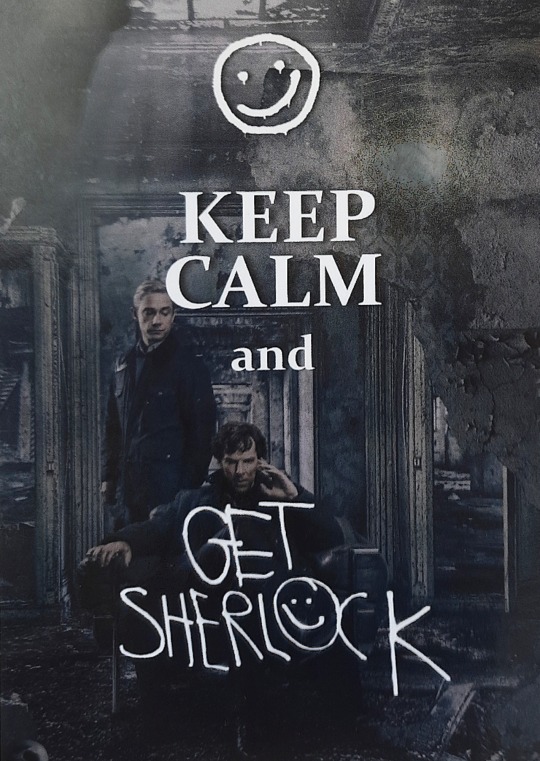#Sherlock Holmes in Germany
Text
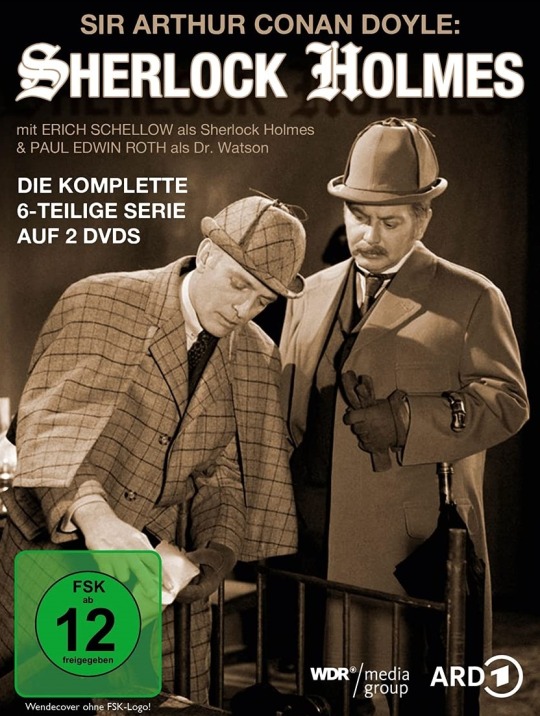
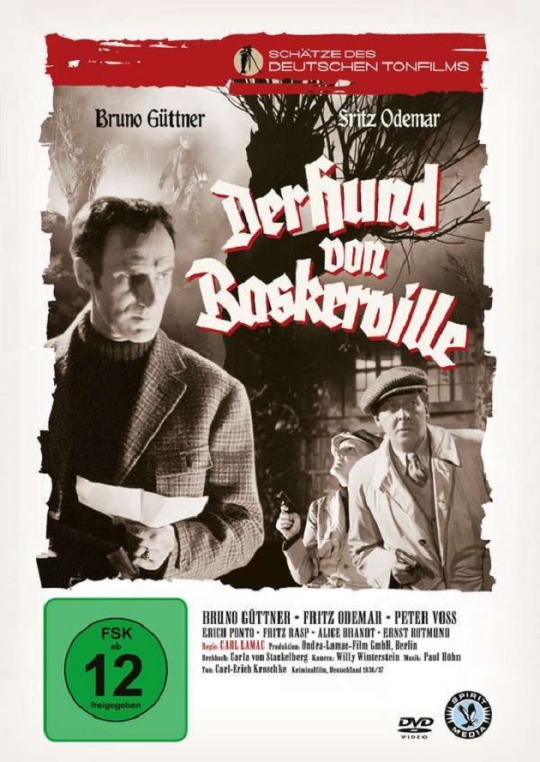
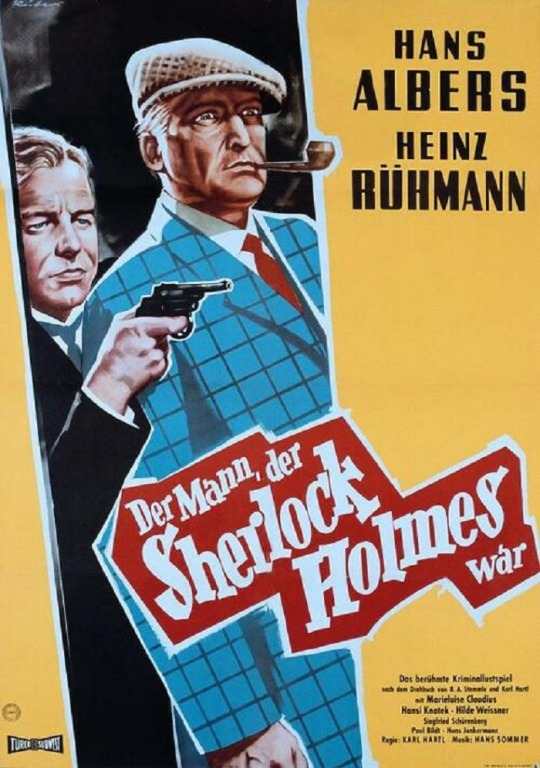
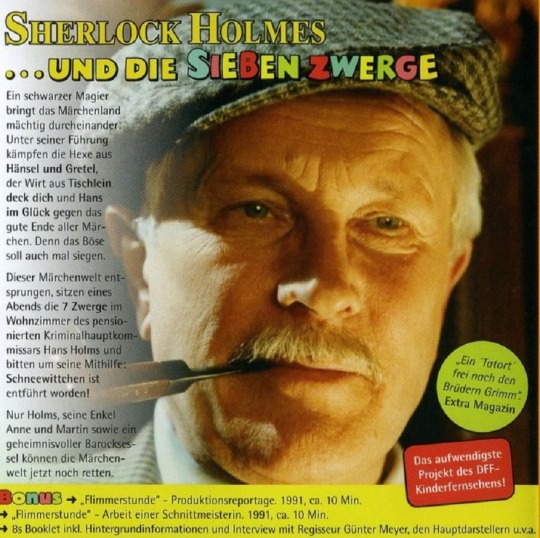
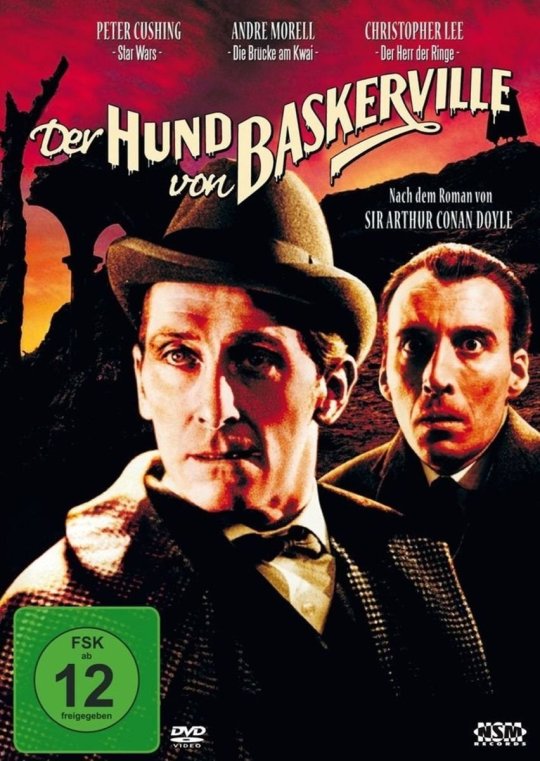
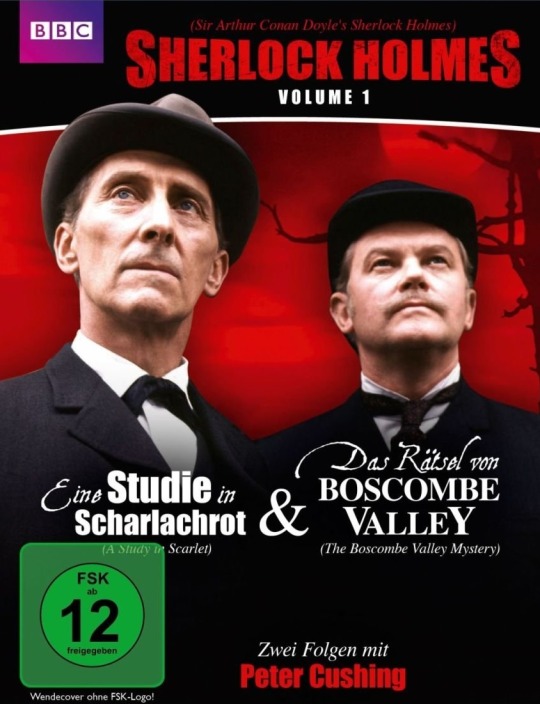

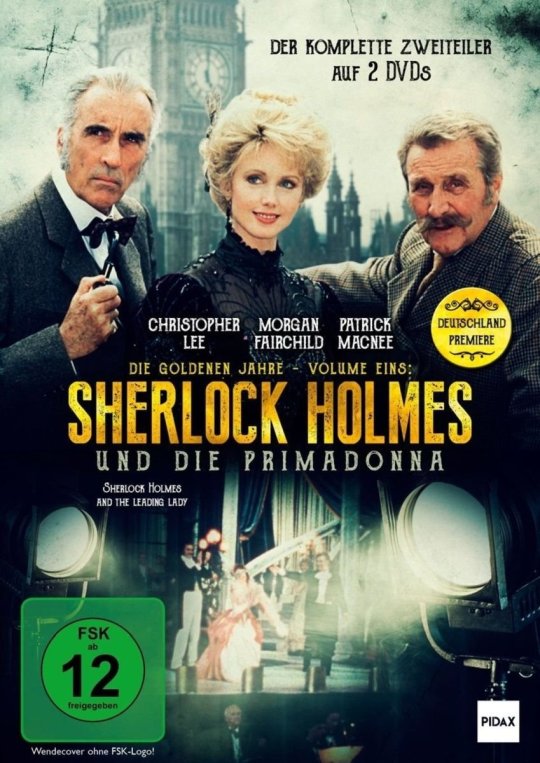
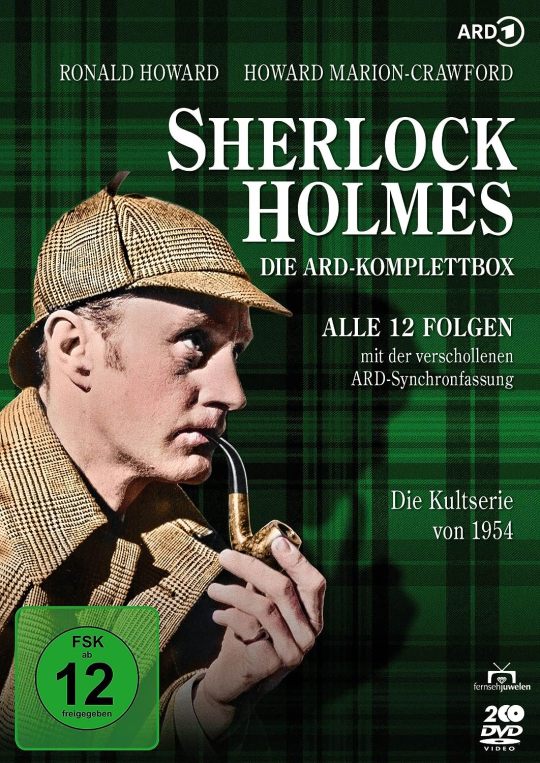
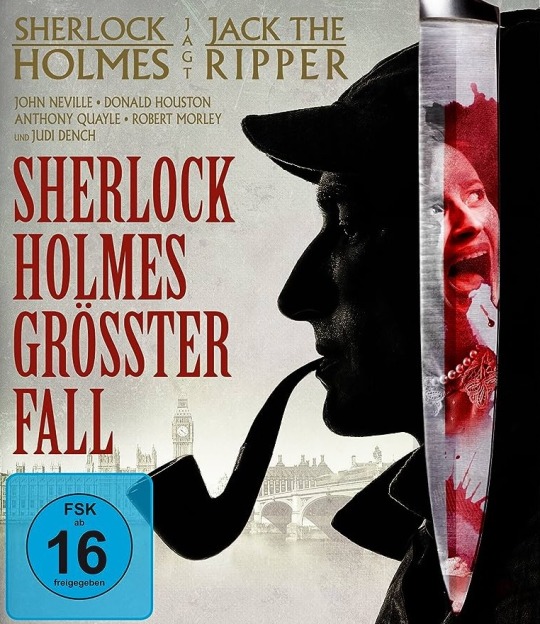
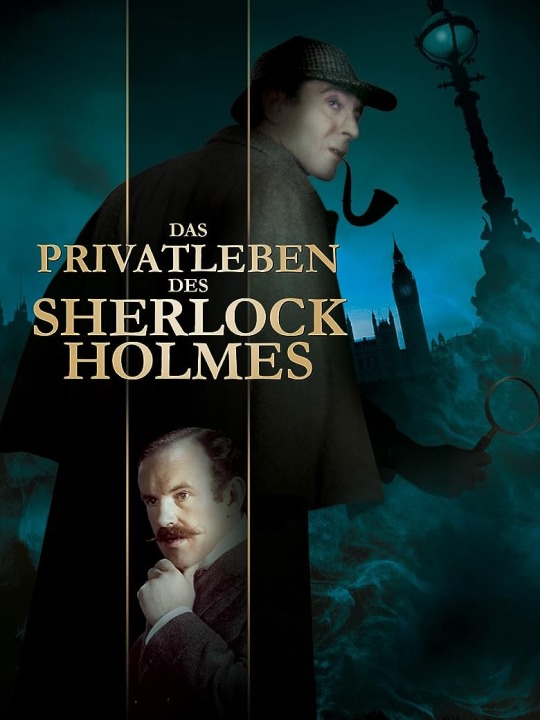
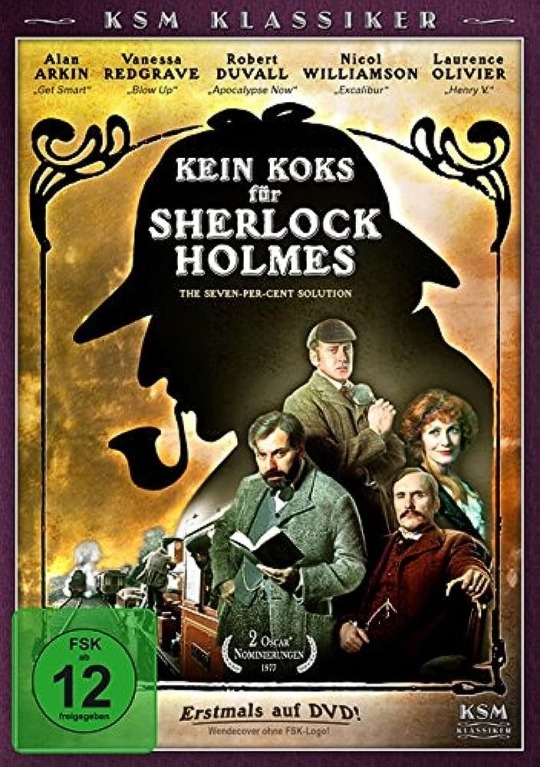
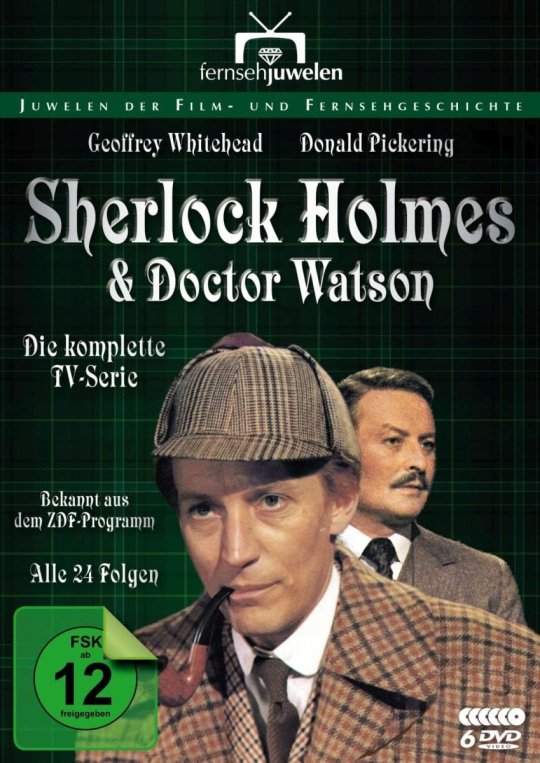
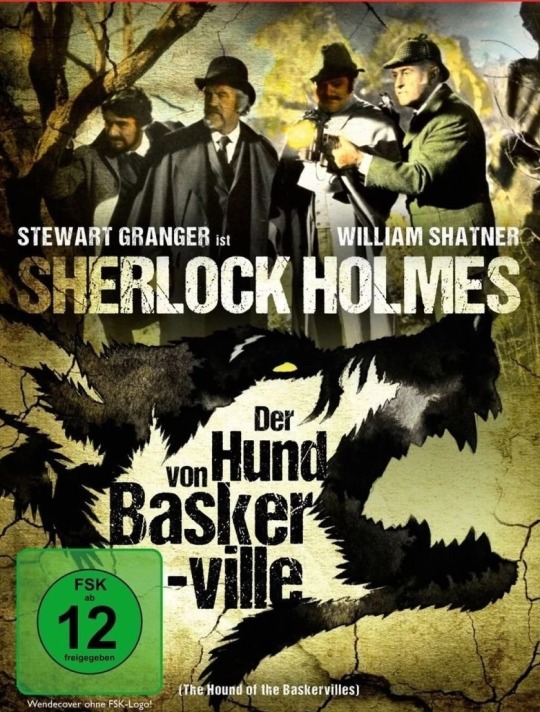
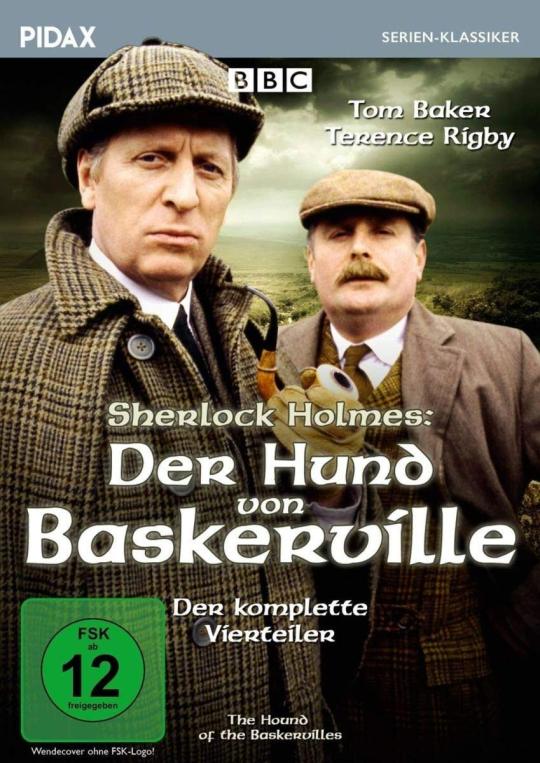
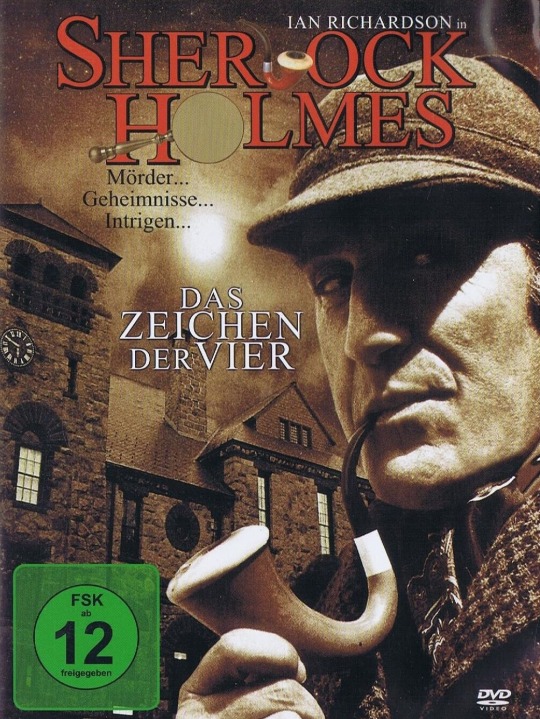
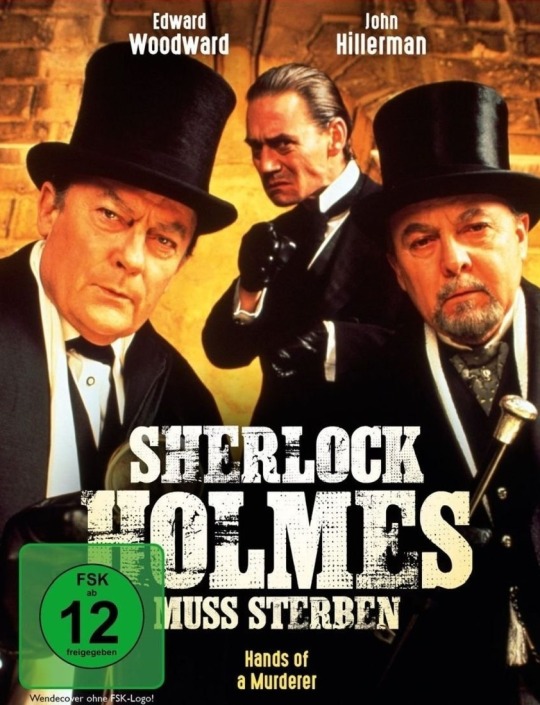
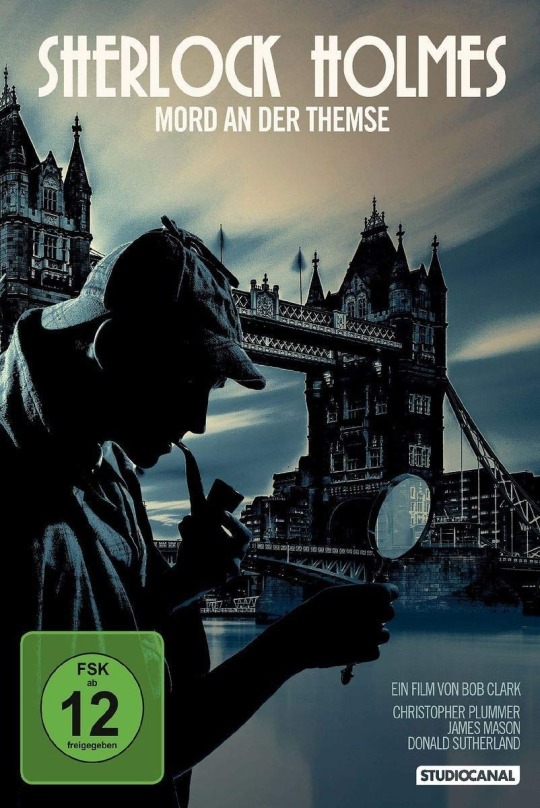
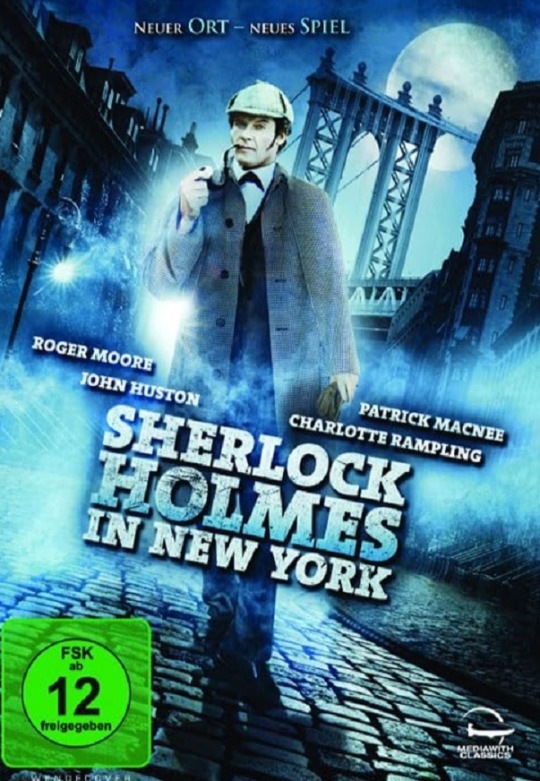

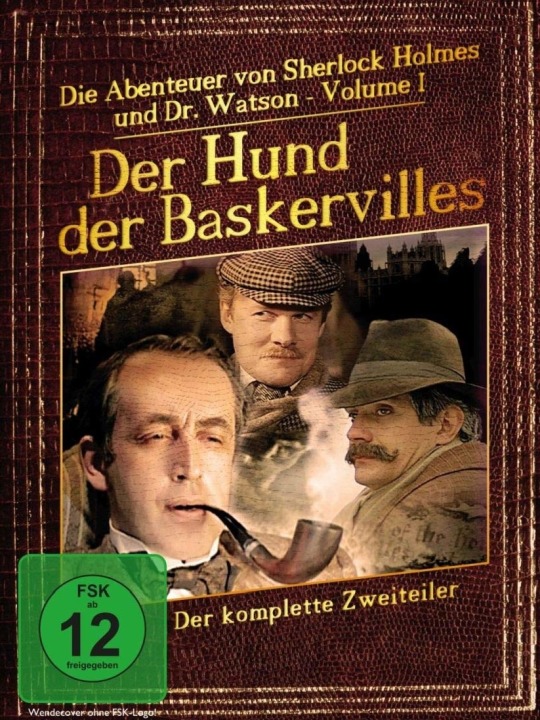
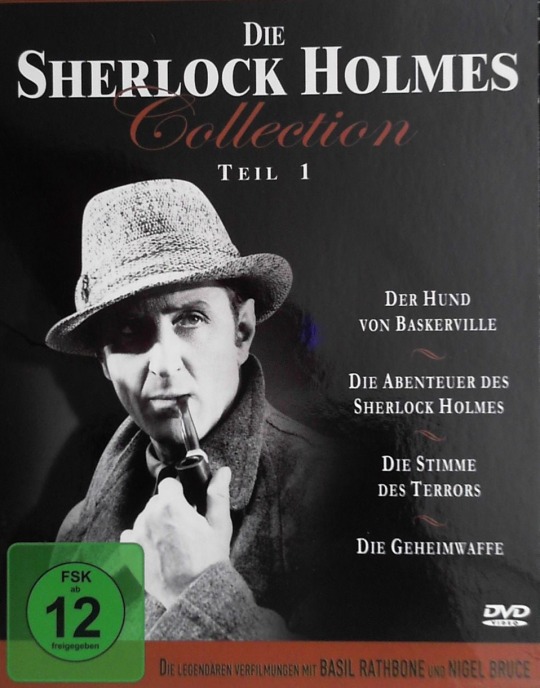
Sherlock Holmes and his faithful friend Dr. Watson have a very long tradition over here in Germany. Personally I’m an avid fan since my teens when I watched “The Hound of the Baskervilles” (1939) starring the immortal Basil Rathbone and Nigel Bruce when it was first broadcast on East German television in 1984.
Nearly all important film adaptions of the adventures of Sherlock Holmes and Dr. Watson have been dubbed and broadcast in Germany either in the cinema or in television. Here are a few examples:
In 1969 and in the early and mid Eighties East German television first dubbed and broadcast nearly all movies starring Basil Rathbone and Nigel Bruce. All films about the Nazi issue were only dubbed after the fall of the wall. All films are relaesed on DVD and they are are frequently repeated. Theses films are so hugely popular over here that Basil Rathbone is considered as the epitome of Sherlock Holmes by most viewers. For me personally he is the reason for my lifelong enthusiasm for Sherlock Holmes. “The Hound of the Baskvervilles” in the first German dubbed version from 1984: https://youtu.be/sD9M7pxP7Nk
In the early and mid Eighties East German television dubbed and broadcast the Russian television series starring Vasily Livanov and Vitaly Solomin. It was very well received but never hugely popular in the former GDR and was never repeated since its premiere. This series was never broadcast in West German television, Sadly not all dubbed films still exist in the archives but the remaining ones have been released on three DVDs in 2019 in the German version. As for me I simply love these two wonderful actors in these roles and so I made a video tribute in honour to their unforgettable portrayals: https://youtu.be/0jaSdOrntDc
The miniseries “The Hound of the Baskervilles” (1982) starring Tom Baker and Terence Rigby as Holmes and Watson were dubbed and broadcast at East German television in 1985.
In the mid and late eighties East German television dubbed and broadcast the Granada series starring Jeremy Brett as Sherlock Holmes. The series didn't achieve anywhere near the popularity with the general public as it enjoys in the English-speaking world. The series was only very rarely repeated but is now completly available on DVD.
The Hammer film “The Hound of the Baskervilles” (1959) starring Peter Cushing as Sherlock Holmes and André Morell as Dr. Watson was a great success in West Germany. The German dubbed version can be watched here: https://youtu.be/SWgtjG8O_qQ The television series starring Peter Cushing and Nigel Stock as Holmes and Watson was never broadcast on German television. The episodes were only dubbed for DVD in 2017.
In 1962 Terence Fisher directed the movie “Sherlock Holmes und das Halsband des Todes” (Sherlock Holmes and the Deadly Necklace”) starring Christopher Lee as Sherlock Holmes and Thorley Walters as Dr. Watson. The cast included numerous German and Austrian actors includig Hans Söhnker (1903 - 1981) as Professor Moriarty. Fun fact: actor Harry Wüstenhagen, who dubbed Christopher Lee in this movie also dubbed Ian Richardson, John Neville and Nicol Williams in their portrayals of Sherlock Holmes. This movie is available on DVD as well as the other ones I mentioned.
“Murder by Decree” (1979) starring Christopher Plummer and James Mason as Holmes and Watson was dubbed in West Germany and called “Mord an der Themse” (“Murder at the Thames”). It is available on DVD. The German dubbed version can be watched here: https://youtu.be/AANCR2K17F0
In 1982 West German television dubbed and broadcast the series “Sherlock Holmes and Doctor Watson” starring Geoffrey Whitehead and Donald Pickering. It was quite a success but only very rarely repeated. Meanwhile it is available on DVD. German dubbed episodes can be watched on YouTube: https
Sherlock Holmes in Germany
Alwin Neuß (1879 - 1935) was the first German actor to play the master detective in a movie. In 1914 he played Sherlock Holmes in “Der Hund von Baskerville” (”The Hound of the Baskervilles”). This silent movie was so successful that three sequels were made between 1914 and 1915. Oddly enough Dr. Watson does not appear in them at all. The first film can be watched here: https://youtu.be/PMhVAqef2nY
"Der Hund von Baskerville" (“The Hound of the Baskervilles”) made in 1929 is the last German silent movie about an adventure of Sherlock Holmes. It was directed by Richard Oswald (1880 - 1963), who also directed a German version of "The Hound of the Baskervilles" with three sequels (1914/15) starring Alwin Neuß. Oswald also wrote the screenplay for the very first film version of “The Hound of the Baskervilles” in 1914 which was directed by Rudolf Meinert. The cast is international: an American actor as Sherlock Holmes, a Russian actor as Dr. Watson, a German actor as Stapleton, an Italian actor as Sir Henry Baskerville, an Austrian actress as Beryl Stapleton, an Austrian actor as Dr. Mortimer and a German-Baltic actor as Barrymore. Remarkably, Fritz Rasp (1891 - 1976), who portrays the demonic Stapleton in this movie, plays the servant Barrymore in the sound film version "Der Hund von Baskerville" from 1937. This version is available on DVD and can be watched on YouTube: https://youtu.be/dOO1BwcpP_g
The sound film "Der Hund von Baskerville" (“The Hound of the Baskervilles”) was made in 1937 by Czech director Carl Lamač. The film has a great atmosphere and a cast of then very popular German actors. Especially Erich Ponto (to foreign film viewers very well known for his sinister role as Dr. Winkel in “The Third Man”) as Stapleton and Fritz Rasp (who mostly played sinister roles during his long film career) are great. Unfortunately actor Bruno Güttner (1909 - 1945) as Sherlock Holmes is pretty bland in his role, he even was dubbed by a more experienced actor in this film.
Fritz Odemar (1890 - 1955) gives a good and amusing performance as Dr. Watson and does not portray him as a buffon. The movie is available on DVD and can be watched on YouTube: https://youtu.be/XrbMR9NZkVc
“Der Mann, der Sherlock Holmes war” (“The man who was Sherlock Holmes”) (1937) is a crime comedy directed by Austrian director Karl Hartl. The film starres Hans Albers as Morris Flynn and Heinz Rühmann as Macky McPherson. Albers (1891 - 1960) and Rühmann (1902 - 1994) were two of the most popular German actors at that time, and they are still very popular over here. The film deals with two broke English private detectives who decide to pose as Sherlock Holmes and Dr. Watson to get lucrative jobs. The official authorities obviously do not know that the English master detective and his friend are only products of the imagination of writer Sir Arthur Conan Doyle and want them to to solve the theft of the Red and the Blue Mauritius. When their real identity is established, they are taken to court for fraud. Only now writer Conan Doyle (played by actor Paul Bildt without a moustache) declares that he is the spiritual father of Holmes and Watson. As he is very satisfied with the appearance of Flynn and McPherson, they are acquitted by the court. The false Holmes and Watson even sing a song called “Jawohl, meine Herr’n” (“Yes, gentlemen”) while taking a bath. This crime comedy is very entertaining, I can't find any hints of the Nazi period it was made. The movie was released on DVD and can be watched on YouTube: https://youtu.be/vWz-ZYIKsEI
Altough Holmes and Watson were immensly popular in East Germany there was never made a movie nor a television film or series especially about them. There are only exist spoofs.
In the Seventies the drawing of the lottery numbers were enriched in East German television with short films of different genres. When the number 19 was drawn it was always a humourous crime film. In three of them appaered the English master detective Sherlock Holmes and his faithful friend Dr. Watson. In "James, der Butler" ("James, the butler") we see Ezard Haußmann, who later dubbed Vasily Livanov in "The Hound of the Baskervilles", and Hannes Stelzer. In the monochrome version of "Spuk im Schloss" ("Haunting in the castle") Jürgen Frohriep and Horst Torka played Holmes and Watson. Torka repeated his role as Watson in a new and colorized version of the same story while Alfred Struwe played Sherlock Holmes. These episodes are part of the DVD edition “Die Tele-Lotto Kurzkrimis”. Alfred Struwe returned to the role of Sherlock Holmes in 1979, when he played in a spoof with the absurd title "Kille Kille Händchen" ("Kill, kill little hand").
Photos of it can be seen here: https://www.tumblr.com/flammentanz/626097658197622784/completely-unknown-german-sherlock-holmes-in-the?source=share
The East German children movie “Unternehmen Geigenkasten” (“Operation violin case”) made in 1984 deals with two school boys who want to solve crimes like Holmes and Watson after they have seen “Der Mann, der Sherlock Holmes war” on television. This film can be watched here: https://youtu.be/5CDlfPl6ibU
“Sherlock Holmes und die sieben Zwerge” (“Sherlock Holmes and the Seven Dwarfs”) made in 1992 by director Günter meyer was one of the last big production of East German television after the fall of the wall. The eight part children series starres Alfred Müller (1926 - 2010) - a big star in East Germany - as newly retired Detective Inspector Hans Holms (the only real connection to the master detective is his name and sometimes his clothings) who looks after his grandchildren Anne and Martin while his daughter and his son-in-law are abroad. With the help of a magical armchair, Holms and his grandchildren can travel to Wonderland, where they are inter alia asked by the seven dwarfs to search for the kidnapped Snow White and meet other fairy tale characters. Their great adversary in all adventures is a demonic black magician.
The whole series is available on DVD. The trailer can be watched here: https://youtu.be/blrc8cE6jSk
For a serises about famous detectives the television movie “Sherlock Holmes liegt im Sterben” (“Sherlock Holmes is dying”) was made for the West German television in 1954. It starres Ernst Fritz Fürbringer (1900 - 1988) as Sherlock Holmes and Harald Mannl (1904 - 1964) as Dr. Watson. The complete movie is lost, there is only this fragment that still exists: https://youtu.be/LGvELtv6Q10
“Der Hund von Baskerville” (“The Hound of the Baskervilles”) was made for West German televsion in 1955. It was directed by Fritz Umgelter and starres Wolf Ackva (1911 - 2000) as Sherlock Holmes and Arnulf Schröder(1903 - 1960) as Dr. Watson. I don’t know if this movie still exists in the archives.
“Das Zeichen der Vier” (“The Sign of Four”) was made for West German television in 1974 starring German actor Rolf Becker (born in 1935) and French actor Roger Lumont (born in 1934). It was never repearted since, and I don't know if it still exists in the archives. Here are Becker and Lumont:
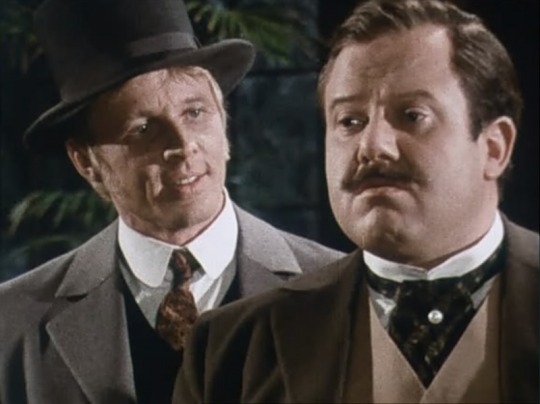
In 1966 the television movie “Conan Doyle und der Fall Edalji” (“Conan Doyle and the case Edalji”) directed by Karlheinz Bieber was made. It starres Paul Klinger (1907 - 1971) - who mostly played likeable roles and was very popular because of it in Germany (because of his sonorous voice he also was a verya renowned voice actor) - as Sir Arthur Conan Doyle. The film is based on facts that took place from 1903 until 1907. Young Indian solictior George Edalji was exposed to racist hostilities and was wrongly accused of animal mutilations. Arthur Conan Doyle made his own investigations which led to an acquittal of Edalji. In the movie Conan Doyle uses the methods of Sherlock Holmes to solve the case. The film is available on DVD and can be watched on YouTube: https://youtu.be/32H3PmBcJrM Paul Klinger as Sir Arthur Conan Doyle:
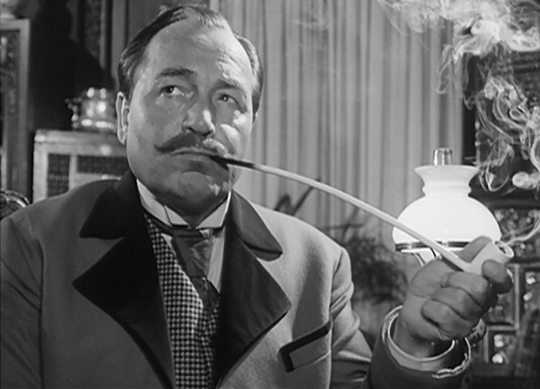
In 1968 Germany got its own Sherlock Holmes and Dr. Watson at last. In 1967 the WDR (Westdeutscher Rundfunk), a local TV channel of the West German television, produced a six episode television series about the English master detective Sherlock Holmes. Strangely enough, the series was not broadcast under the title “Sherlock Holmes” but the opening credits name the author Arthur Conan Doyle. The series was based on translated scripts written for the BBC series starring Douglas Wilmer. The series was first aired on Sunday afternoons from from October 1, 1967 to March 18, 1968.
Erich Schellow (1915 - 1995) - actually a theater star, that only rarely appeared in movies and on television (the critic Friedrich Luft said about him “He speaks like a God!”) played Sherlock Holmes, while his faithful friend Dr. John H. Watson was played by Paul Edwin Roth (1918 - 1985). The actors knew each other from their theater work in Berlin and got along very well during the filming.
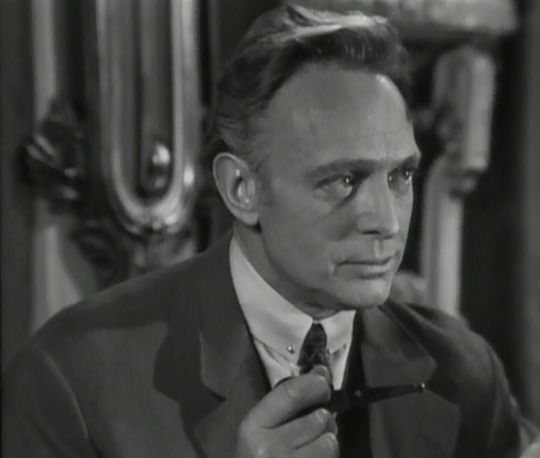
Paul May, a renowned director in film and television with a long-standig career, had a certain idea of Sherlock Holmes from the start. He wanted an impeccable, dignified, and noble master detective. To create a contrast to other television detectives at that time May avoided any action scenes. Erich Schellow wanted to play a bit more depraved Holmes including the use of cocaine but May refused strictly. In 1991 Erich Schellow was made an honorary member of the German Sherlock Holmes Society.
Paul Edwin Roth were allowed more liberties to portray Dr. Watson and he gladly took the opportunity. He is not a buffoon but instead he is amusing and witty (sometimes he even philosophizes), has a perfect name and address memory, he knows how to handle a weapon (usually his army revolver) and is a faithful friend in all situations. His favorite words are “very interesting”, a fact on which he comments ironically in “Das Haus bei den Blutbuchen” (“The Copper Beeches”)
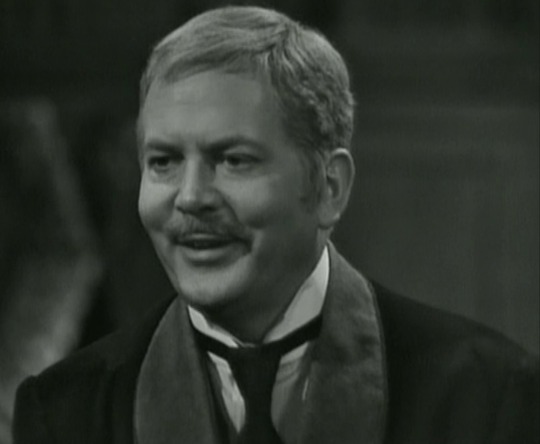
While the use of cocaine was refused by the director, the consumption of tobacco and alcohol by Sherlock Holmes and Dr. Watson is immense. Even dear Mrs. Hudson (Austrian actress Manja Kafka), who is not only a devoted maid (not a landlady as she actually is) but also amusingly cheeky, is hard-drinking. The running gag within the series is that the cane of the umbrella of Dr. Watson serves as a vessel for alcoholic beverages.
It’s incomprehensible that this wonderful series was only repeated once in 1991 and never since. Sadly Germany’s Sherlock Holmes was never given the the attention and appreciation he deserves. Fortunately this gem was released on DVD in 2012 and re-released in 2021.
For any information about Erich Schellow and Paul Edwin Roth as Holmes and Watson please check my blog.
youtube
youtube
#sherlock holmes#dr. watson#sherlock holmes in germany#german sherlock holmes#sorry for any possible mistakes#english is not my first language
30 notes
·
View notes
Text
Sherlock is now a topic in Germany's final exam to get a high-school diploma.
It was an evening full of research until I found a former student who sold it to me 😊

18 notes
·
View notes
Text
birthday cake
#you know those dreams where you have a kid and you raise them#so maybe i've never known grief but#when i was sixteen i dreamt i had a little brother#i was eight again and holding my sister's hand as we watched the door of the delivery room with sleepy eyed stares#she's four and holding her jellycat with me because i insisted i didn't need one because i was eight#it's midnight in germany. i'm holding my knees waiting#waiting#someone comes out and tells us it's a boy#i saw the joy in my father's eyes#i felt it in mine too#i watched him through the glass of the observing deck#he was new and he was beautiful and they'd called him alistair and i loved him#he grew to love cats and rockets and know all the lyrics to all the queen songs and be good at maths#he had my sister's eyes and my hair that was always grown out#he hovered on the doorway of my bedroom#his shadow was a permanent fixture in the landscape of my childhood room#he ate a lot of sugar but refused to eat chocolate#because he knows i can't have it#he played the violin because sherlock holmes did#his jokes are awful#but we laugh anyway#my sister and i taught him to swear and swim and play the piano#when i woke up i felt an inconsolable grief knowing that i was sixteen again and he never existed#everyday i'm forgetting his face little by little#so if dreams really are different universes then he's twelve today and i'm at home and i've just made his birthday cake
2 notes
·
View notes
Text
I just had the sickest idea.
#okay so. what do Dracula Frankenstein and Jekyll & Hyde have in common#they all (sorta) take place in england#Jekyll & Hyde quite literally takes place in London#Dracula is kind off complicated geographicly but from my understanding at the time it was England so#Frankenstein takes place in germany but it also changes a lot#specifically when Victor and Henry go on a trip to england this will be relevant later#now what if i told you#that all of those events would take place at the same time#all of the stories would happen pretty close to canon up until a certin undetermined point where the stories would convergence#and then#and then it will become a battle royal.#this idea is so fuckinf cool#like. a battle between the most famous Fictional horror characters who just so happend to all be in england#and i used those characters as example cuz they're the only ones i know but. it would be so sick if there were others who fit the criteria#i will research#i want it to focus of the horror (esque) characters but having a slightly less important sherlock holmes be there as well?? fucking sick#oh yeah and all the characters are book accurate#mainly because i think it would be so funny if Frankenstein's monster was just kind of there and very much did not want to be involved#while Victor would live up to his name andact as the fictional horror rep of Frankenstein#also each character would have a small supporting cast from their respective books#imagine. imagine Elizabeth and Mina interacting#what sort of mischief would the time appropriate mysoginist caricature of the protagonist wives be up too i wonder#they would be besties#perhaps more#Emma fits here as well but i feel like she could get along with Frankenstein's monster pretty well#like the vibes and stuff idk#omg Jon and Victor interacting#omg Jon and Henry interacting#ran out of tags oof but like. this is so cool. it's so sick. i wish i was good at writing then i would have written this and became famous#i lovee making unrebloggeable posts it's my favourite think to do ever
5 notes
·
View notes
Note
Your German is actually really good, Sherlock! (I don't even know why I am surprised.) Maybe your next holiday should go to Germany! I suspect that John understands even less German than French, so you could show off your language skills some more. :D
Dankeschön, ich weiß.
Yes, John would indeed understand even less in german. Which could be very funny, given the fact that 'mein Freund' and 'mein Freund' means something completely else, although it is the same word. Even more fun than calling John 'mon petit ami' in france the whole time. Because he is my small friend in fact with how short he is. And John for sure would like germany, with all the beer and food. Or maybe a case could lead us there. Any recommendations for german cities worth visiting?
#if you speak german you understand the whole mein freund troubles#jean mon petit ami#john mon petit ami#john watson mein freund#john watson mon petit ami#sherlock holmes#bbc sherlock#sherlock bbc#roleplay#johnlock#sherlock roleplay#johnlock roleplay#john watson#sherlock fandom#sherlock#german sherlock#sherlock speaks german#german#deuschtland#sherlock germany#sherlock rp#johnlock rp#rp#multilingual sherlock#sherlock the multilingual genius#sherlock the polyglot#sherlock answers#sherlock answering asks#sherlock speaks french
14 notes
·
View notes
Text

#I knew someone who compared me to Germany from Hetalia and Mycroft from The Adventures of Sherlock Holmes. It very much disappointed her to#figure out I'm not really like either of them.
1 note
·
View note
Text
Ich denke, dir würde diese Geschichte gefallen: " Genie, but still a child " von JoshiOtaku auf Wattpad https://www.wattpad.com/story/215262901?utm_source=android&utm_medium=com.tumblr&utm_content=story_info&wp_page=story_details_button&wp_uname=JoshiOtaku&wp_originator=we6GTtwSy9cVadCCdpqr8btovrRGmnZqmWd136ZEsyav5IwWQIdmbxDkQDR%2F6I%2Bbz5j5KA43o%2FtUspo5vx%2BwJ0egSkpFpogGurl20uTl5VH8i13nuSdteM98BF0T5ilt
3 notes
·
View notes
Text
Why is it so damn hard to find books with pretty covers in german???
I could scream in joy whenever I find a very pretty classic novel.
I might be able to read books in english but reading classical lit in english is something completley different.
#I have a stunning special edition of a sherlock holmes book and I treasure it#but like. Finding pretty books is so hard#classical lit#classical literature#books#classical books#book struggles#germany
5 notes
·
View notes
Text
Translations:
Name?
Leon
Nickname?
I don’t have one.
Favorite holiday destination?
Ibiza 🇪🇸
Favorite food?
Lasagne
Favorite artist?
RAF Camora (Austrian rapper)
Hobby/hobbies outside of football?
All ball sports
Position?
Midfield
Who would you like to have dinner with?
Cillian Murphy
Where would you live if you could?
Bochum
If I wasn’t a footballer, then…
I’d be a lawyer.
I was inspired by…
Sherlock Holmes
For me, sport is…
Passion
I can switch off best with…
Music
Playing for FC Bayern is…
A great privilege
In 2024, Germany will be…
European champion
#Leon as a lawyer would 100% shout ‘das ist auf gar kein fall richtig!’ any time he had an objection and you can’t convince me otherwise#leon goretzka#videos#interviews#footballer quotes
58 notes
·
View notes
Text
youtube
German politic comedy, insane rent prices in Munich and Sherlock. Pure Gold. 😆
Sherlock - his hardest case: the impossible flat hunt
Best part is the rooftop scene.
Sherlock: "Where is the flat you wanted to show me? This is only a rooftop."
Moriarty: "Well you said 1800 cold* it's cold at night here. For 1,8k your client can throw a mattress here on the ground."
Sherlock: "You mad cutthroat. There has to be a affordable flat in this city"
Moriarty: "Omg Holmes in what times do you live? Big City and affordable flat cancel each other out. Like Gottschalk** and retirement"
*cold rent means in germany basic rent. No insurance, utilities, taxes etc.
** Thomas Gottschalk is a german TV presenter who will never retire. Like never ever. 😅
149 notes
·
View notes
Text
“Lolita isn’t a perverse young girl. She’s a poor child who has been debauched and whose senses never stir under the caresses of the foul Humbert Humbert, whom she asks once, “how long did [he] think we were going to live in stuffy cabins, doing filthy things together…?” But to reply to your question: no, its success doesn’t annoy me, I am not like Conan Doyle, who out of snobbery or simple stupidity preferred to be known as the author of The Great Boer War, which he thought superior to his Sherlock Holmes.
It is equally interesting to dwell, as journalists say, on the problem of the inept degradation that the character of the nymphet Lolita, whom I invented in 1955, has undergone in the mind of the broad public. Not only has the perversity of this poor child been grotesquely exaggerated, but her physical appearance, her age, everything has been transformed by the illustrations in foreign publications. Girls of eighteen or more, sidewalk kittens, cheap models, or simple long-legged criminals, are baptized “nymphets” or “Lolitas” in news stories in magazines in Italy, France, Germany, etc.; and the covers of translations, Turkish or Arab, reach the height of ineptitude when they feature a young woman with opulent contours and a blond mane imagined by boobies who have never read my book.
In reality Lolita is a little girl of twelve, whereas Humbert Humbert is a mature man, and it’s the abyss between his age and that of the little girl that produces the vacuum, the vertigo, the seduction of mortal danger. Secondly, it’s the imagination of the sad satyr that makes a magic creature of this little American schoolgirl, as banal and normal in her way as the poet manqué Humbert is in his. Outside the maniacal gaze of Humbert there is no nymphet. Lolita the nymphet exists only through the obsession that destroys Humbert. Here’s an essential aspect of a unique book that has been betrayed by a factitious popularity.”
- Vladimir Nabokov in an Interview with Bernard Pivot for Apostrophes (1975)
#vladimir nabokov#dolores haze#im reading collected interviews rn and he says this over and over and over again#and no one ever listened#lolita novel
234 notes
·
View notes
Text
Part 10 of "Letters from Watson" of The Sign of the Four starts with Sherlock Holmes enthusiastically infodumping.
He appeared to be in a state of nervous exaltation. I have never known him so brilliant. He spoke on a quick succession of subjects,—on miracle-plays, on medieval pottery, on Stradivarius violins, on the Buddhism of Ceylon, and on the war-ships of the future,—handling each as though he had made a special study of it. His bright humor marked the reaction from his black depression of the preceding days.
I wondered "why these topics in particular?"
Miracle plays were, in 1890, the subject of a new book by Alfred W. Pollard of the British Museum. It received a positive review in The Spectator.
The Arts & Crafts Exhibition Society had its first exhibition in London in 1888. While handicrafting, the William Morris aesthetic, and such, had been around for a while by then, this was the big organized push for public attention. Not only did the Arts & Crafts movement draw on medieval influences, but many a UK pottery maker was on the site of a medieval kiln and interested in medieval techniques.
Stradivarius violins are, of course, the sought-after antique violin. There were at least two donated to the Musée de la Musique in Paris shortly before the time of this story, as well as a number getting heard by important violinists in important orchestras. Even more interestingly from Holmes' point of view, a factory in Germany had just started making Stradivarius copies.
Buddhism in Sri Lanka had lapsed into torpor in the early 19th century but was, by 1890, well into a resurgence. The kick-off, back in 1866, had been Buddhist monk Mohottivatte Gunananda challenging Christian missionaries to a debate. In 1890, he had just died; but he had founded a political movement.
As for war-ships, in 1889, the Naval Defense Act had passed. It called for the UK Navy to be maintained at least twice as large as the combined navies of the next two largest powers (then France and Russia). War ships -- both quantity and design -- had doubtless been in the news for a while.
These aren't obscure hyperfixations (though I'm all for obscure hyperfixations!). These are conversational topics appropriate for a well-read gentleman of the era: the sort who gets three or four newspapers, reads the book reviews, and then reads the books reviewed. This explains how Dr. Watson and Athelney Jones set him off, or even participated in the conversation.
We also, while on a boat, get the return of Winwood Reade's Martyrdom of Man (making it Chekhov's book reference?). Says Holmes of Reade:
“He remarks that, while the individual man is an insoluble puzzle, in the aggregate he becomes a mathematical certainty. You can, for example, never foretell what any one man will do, but you can say with precision what an average number will be up to. Individuals vary, but percentages remain constant. So says the statistician."
Statistics was not new -- scholarly sorts had become engaged with statistics during the Enlightenment -- but it was in the early stages of being systematized into the mathematical field we know today. Holmes sounds like he would have been a fan of Francis Ysidro Edgeworth's Metre-like: Or the Method of Measuring Probability and Utility, published in 1887, since it attempted to use probability as the basis of inductive reasoning.
Then we have a boat chase.
I love the boat chase. I feel like the boat chase might have contributed to inspiration for the train chase in Nicholas Meyers' The Seven Percent Solution, though I also feel that a train chase needs no justification other than "we have two trains and a problem."

Our heroes leave from Westminster Wharf, which I'm assuming is roughly today's Westminster Pier, which had not yet received its statue of Boudica. (Westminster is conveniently southeast of Marylebone, where Baker Street is located.) So that long gentle curve is the river past St. Paul's and the Tower of London and under multiple bridges. They pick up the Aurora about where the river heads into that first shallow down-curve and chase it up and down, around the Isle of Dogs, up past Greenwich, and around the down curve at Blackwall. So they must catch it as the river starts to straighten and widen.
A pleasure tour from Westminster Pier to Greenwich today takes about an hour, but those are the boats their launch was passing like they were standing still. The Eva, a Thames Steam Launch of the appropriate era, was one of the speediest of the time and could achieve 16.5 miles/hour.
Then... I really would have preferred an actual monkey. We've now had in this chapter so many reminders of the achievements of European, particularly English, civilization that the avalanche of adjectives framing the Andaman Islander as primitive stands out as a deliberate counterpoint, despite the inclusion of Ceylon and Winwood Reade. Will we ever know what the Andaman Islander Accomplice's motivations were? (If yes, will I wish even more fervently that we'd just stuck with a monkey?)
I love the boat chase, though.
25 notes
·
View notes
Text
His Last Bow
Originally titled in full "His Last Bow. The War Service of Sherlock Holmes" and later "His Last Bow: An Epilogue of Sherlock Holmes", this was originally published in 1917.
It is the final story in His Last Bow, the final short story in the canon covered by Letters from Watson and agreed by all the key chronologists to be the final canon appearance of Holmes and Watson.
Sir Arthur Conan Doyle had openly supported British entry into the First World War in 1914.
The story came about after a visit to the Western Front in 1916; asked by a French general what Holmes was doing, Doyle had responded that he was too old to serve. He then decided to write this story as a means of boosting morale.
To put it mildly, the British public had gone a bit spy-crazy in the lead up to the war; fearing "Teutons serving them croutons" i.e. Germans living in the UK acting as intelligence agents for the Kaiser.
The Riddle of the Sands is one such work of popular literature on this theme, which is the subject of Letters from Carruthers coming in September.
There was also the fantastical works of William Le Queux, who started off with the French and Russians as his enemies before switching to the Germans; he also had his works serialised in the Daily Mail, a British middle-market tabloid that was founded in 1896 and has been happily engaging in right-wing sensationalism since to the point Wikipedia has banned them as a source. Le Queux for his part believed the Germans were out to get him for exposing their spy networks - he hadn't, they weren't and the Metropolitan Police refused him protection.
The Benz company had produced the first practical motor car in 1885; they of course later merged with Daimler to become Mercedez-Benz. I cannot find a 100hp example of their vehicles.
The German Chancellor in 1914, Theobald von Bethmann Hollweg, was a moderate, who reluctantly went along with many German policies like unrestricted submarine warfare and tried to initiate peace proposals on a number of occasions in the war before being ousted in 1917.
Flushing is the historical English name for the Dutch port of Vlissingen; it had a ferry connection to Sheerness until 1994.
At the outbreak of war, diplomats on both sides were allowed to return home unmolested, after locking down their embassies and burning anything sensitive they could not take with them.
Britain, France and Prussia had signed a treaty in 1839 guaranteeing the neutrality and independence of Belgium. The German invasion of the country on 3 August gave the UK justification for war and moved a Cabinet divided over the matter to firm unity.
There was a fear of Irish civil war at this point; the Liberal government, reliant on Irish and Labour support for a Commons majority after the two elections of 1910, had passed legislation creating a devolved government for the island, called Home Rule. This was vehemently opposed by Ulster Protestants and both sides were receiving weapons - from Germany in fact - in preparation for a fight as Whitehall tried to arrange a compromise. The Germans in fact believed the British would be distracted by a civil war, but in fact the Home Rule legislation was suspended for the duration and both militias decided to support the war effort. That stopped things... until the more radicial Irish Republic Brotherhood launched the Easter Rising of 1916.
"Window-breaking Furies" refers to the suffragette movement that sort votes for women, some of who engaged in direct action like breaking windows and also planting bombs or arson, although they made sure the latter was done when the buildings were empty to avoid killing anyone. These tactics were as controversial at the time as the tactics of modern-day groups like Just Stop Oil. When the war broke out, the suffragettes stopped their militant actions and supported the war effort; their imprisoned members being released as part of an amnesty.
John Bull is a national personification of the UK, typically a stout middle-aged man in a Union Jack waistcoast, frequently seen in cartoons at this time. He rather fell out of popular use post-war and is rarely seen today, unlike Britannia, who remains a widely used figure.
The Rosyth Dockyard was built from 1909 for refitting Royal Navy ships and submarines; although now privatised, it retains that role and is currently building the five Type 31 frigates.
Carlton Terrace was the home of the German Embassy until 1945; after the war, the property and its contents were sold off at auction. The Federal Republic of Germany set up at Belgrave Square in 1951 and remains there to this day.
Junkers were the land-owning aristocracy of Prussia, who exercised considerable political power up until 1945, at which point most of their holdings ended up in the USSR, Poland or what became East Germany. The land was broken up, usually ending up in collective farms; accused of war crimes, those Junkers who ended up in Soviet hands frequently ended up in NKVD camps or even executed. Their descendants did not get them back after reunification.
The King's English is another name for Received Pronunciation, the "standard" dialect and accent of British English.
Tokay or Tokaji is a sweet wine from the Tokaj regions of Hungary and Slovakia, the designation being protected under EU law in a similar way to Champagne. Imperial Tokay, which was the highest quality Tokaji Essencia, was reserved for the Austrian imperial cellars, often being passed to other European monarchs as gifts. This stuff is still drinkable after over 200 years and even the relatively new stuff isn't cheap.
A naval flotilla would be based at Harwich in both World Wars.
The reference to Holmes being sixty here is where the common estimate of 1854 being his birth year comes from.
Portland is a prison and young offenders' institution in Dorset. Notable past inmates include George Edalji (whose miscarriage of justice was exposed by Doyle), John Babbacombe Lee ("The Man They Couldn't Hang") and the controversial comedian Roy "Chubby" Brown.
Fratton is an area of Portsmouth.
In reality, the Home Section of the Secret Service Bureau, later MI5, had managed to identify the key German agents by monitoring their postal correspondence. The police then rounded them up in August 1914 and once the cross-sea cables were cut, contact with any agents in the UK became close to impossible. Little intelligence of any use came from them in any event; the Germans seem to have not even been aware of the British Expeditionary Force being sent to France, which was hardly a small event. Gustav Steinhauer, head of German naval intelligence's British section, got subjected to a rant about his agency's incompetence from the Kaiser that lasted the better part of two hours.
Twelve German spies would be executed during the war, eleven by firing squad at the Tower of London, which hosted its final execution (also of a spy) in 1941.
Skibbareen is a town in County Cork, now in Ireland.
The final speech by Holmes at the end also featured in the 1942 Basil Rathbone film Sherlock Holmes and the Voice of Terror, based on this story.
So Holmes and Watson drive off into the sunset. What happened to them after that? All we know is that both survived the war and at some point Dr Watson stopped writing about his dear friend. They deserve to have had a long retirement.
I will be doing these for the individual chapters of the novels next year; I have already done ones for the first two chapters of A Study in Scarlet that I will repost.
44 notes
·
View notes
Text
Top 10 Sherlock fics by kudos in 2023
Top 10 fics completed in 2023 that garnered the most kudos on AO3. Excluded: chaptered "fics" that are actually collections of standalone ficlets and crossovers that are mostly about the other fandom. Fics that began posting earlier (in some cases, years earlier) obviously have the advantage of more time to rack up kudos. Kudo counts as of 2 Jan 2024.
1. 1,720 kudos: The Case of the Man Who Was Wanted by MyDearLadyDisdain (232K, M, Sherlock/Harry Potter)
After an inexplicable case in Surrey, Sherlock is after the strangest criminal he's ever encountered: a mass murderer, that has eluded the authorities for almost 14 years. Unfortunately, Sherlock Holmes is the only one that can see right away that this Harry Potter character is completely innocent. And hang on, is that tea set floating?
2. 1,682 kudos: Shift by stopthat (48K, E, Johnlock)
Sherlock is tired. John senses a shift.
3. 1,102 kudos: Ride On by Silvergirl (38K, E, Johnlock)
After the disastrous reveal at the Landmark, John tells Sherlock there can be no excuse for what he’s done, and no forgiveness. Sherlock leaves London and starts a new life, and not even the British Government knows where. It’s up to John to track him down and make things right, with a trip around the world and a clue only John would recognize.
4. 851 kudos: Till Death Do Us Part (Not Yet, Not Yet) by Civilized_muppets (8K, T, Johnlock)
In which Sherlock and John have been married for years, not that any member of the yard has ever heard of John, much less that Sherlock was married at all, until John is kidnapped from Afghanistan.
5. 797 kudos: The story of the Forgotten Wallet. by Headphones_on_the_Skull (25K, E, Johnlock)
Just some dirty Alpha/Omega Johnlock porn.
6. 788 kudos: Nothing to Celebrate by DiscordantWords (30K, M, Johnlock)
Sherlock Holmes is back from the dead. Things only get worse from there.
7. 726 kudos: A Tale of Two Soldiers by batslikepastel (14K, T, Johnlock, Jolto, Mystrade)
It's Christmas, and Sherlock and John are finally flatmates again after the tumultuous events of the previous year. But a sudden revelation about John's sexuality and James Sholto's unexpected presence throw a wrench into Sherlock's plans, and his jealousy threatens to overwhelm him even as John remains blithely oblivious. Their relationship has reached a turning point, and the ball is in John's court now.
8. 671 kudos: Nightjet by khorazir (22K, M, Johnlock)
Officially deceased for eighteen months and still looking for the last remainders of Moriarty’s criminal empire, an exhausted Sherlock boards a night train in Germany to bring him to his next hunting ground. Due to a mishap with the sleeper cars, he is forced to share a compartment with a stranger – who turns out to be not quite as strange as Sherlock thought. The universe isn’t lazy, after all …
9. 646 kudos: Our Love Keeps the Things It Finds by her_ladyships_soap (25K, T, Mystrade)
Everyone has a soulmate. Everyone. It's simple human biology. Over the course of every person's life, they develop tattoos of the things their soulmate loves most. Though he has always disliked the concept, Mycroft Holmes is painted from head to toe with dozens of brightly-coloured tattoos. Greg Lestrade, once-firm believer and hopeless romantic, has just nine. They are all quietly sophisticated, sketched in smooth shades of black and grey and easy to hide. Neither of them has gained a tattoo in years. But when they both suddenly find new markings, things finally fall into place.
10. 636 kudos: In Fine Spirits by EventHorizon (189K, M, Mystrade, Johnlock)
A very upscale bar/private club needs a bartender and scruffy, punky Greg Lestrade is certain he has the right skills (and needs the job), so walks in to apply in person. He didn't realize that someone else he knew works there, also. Though… 'knew' probably isn't the proper term for a one-night stand where you didn't even learn their name during the fun…
53 notes
·
View notes
Note
Thanks for answering my ask. If you don't mind me asking (again), can I ask your top 5 (or top 3) favorite characters from Black Butler? And why you loved them? And your top 5 favorite moments from the series? Sorry if you've answered this question before....
Hello! Thanks again for the ask. No, nobody has ever asked me that, so I had to think about it. But here it is...
My 5 most favourite characters in BB & why:
1. Sebastian. I love how he's grown from the arrogant and sarcastic demon to 'Sebastian'. I love how surpirsed he is at his own growth and I also love that instead of fighting it, he's actually enjoying the ride? He's certainly aware of these changes, to a certain degree, but he just takes it in stride. I think being as old as he is, he must've been so bored, but with Ciel, he's having fun again (when not facing UT, that is). And of course, I love how possessive and protective he is towards Ciel, even beyond the contract sometimes.
2. Ciel. He's so messed up. He's only 13, but he's committed more crimes than all of England combined 😝 All jokes aside, I love how smart and resourceful he is, how determined he is in achieving his goals. One example is the cricket game. Those bruises all over his hand show just how determined he is and how hard he's practised for this game. He might have other end-goals, but it doesn't change the fact that he's led the Sapphire Owl house to victory. Also, we share similar interests. Just like Ciel, I also like chocolate and Sherlock Holmes.
3. Finny. He's just the sweetest! He's genuinely loyal to o!Ciel and he takes care of him that time in Germany. He always tried his best in taking care of the garden, even though he often gets scolded. I love his cheerful despoition and how he always tried his best - regardless of the result.
4. Charles Phipps. A rather unusual choice, I know. Unlike his partner, Phipps is so calm and collected, but beneath all that, he's a very capable butler and he's actually quite sweet in his own rights, such as fixing the hole on Fin's strawhat and raising the chicken.
5. Tanaka. I don't know where he stands and/or whose side he's on, but I just love how badass he is (slicing a bullet with a sword in the dark of the night), his chibi form, and how wise he is. I think he's one of the very few individuals whom Seb respected (as much as a demon could respect a human, that is). Seb even took his advice to heart, such as when he told Wolf (Gelzer) what Tanaka told him abot how a butler shouldn't die before his master. I think he did play some role in shaping Sebastian into the demon he was today.
Top 5 favourite moments (in the order they appear in the manga):
1. When Seb & Ciel revealed their tricks to Arthur Doyle. It's when we can see how they did everything, how they've calculated every move and how well they work together as a team. I think it's very cleverly done!
2. When Undertaker first revealed his Death Scythe. I think this moment is so cool, especially in the BoA movie with the animation and the sound effects and everything!
3. Sebastian's cinematic record. I love to watch them learn together to be the earl and his butler. I most especially love how far they've gotten since those early days, how much they both have changed. Bonus: the song 'I'm the Butler, You're the Earl' from the Tango on Campania musical is one of my favourites!
4. The scene when Seb wanted to eat Ciel in Green Witch arc. I think this is a very important moment in their relationship. I love that instead of succumbing to the gas, Ciel rose above it and run after Seb. I still don't know for sure what's happening and how much influence Seb has in Ciel's 'dream sequence', but Ciel chose Sebastian.
5. To follow up on #4, I love everything about these panels.
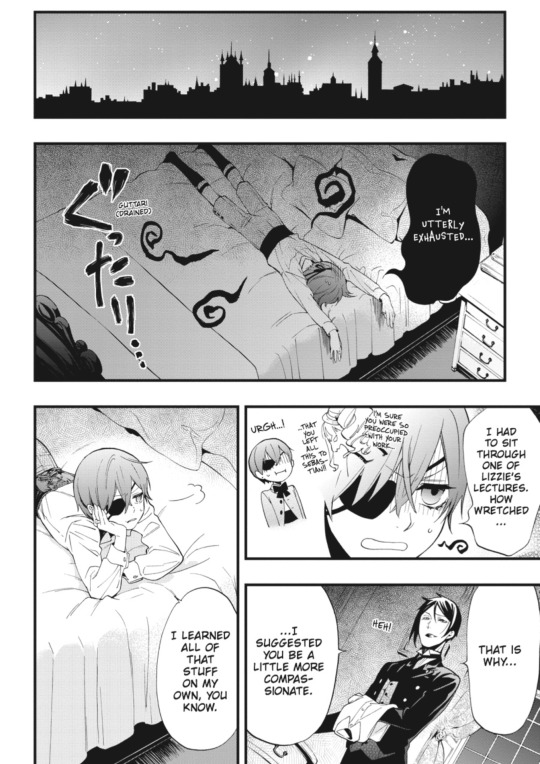
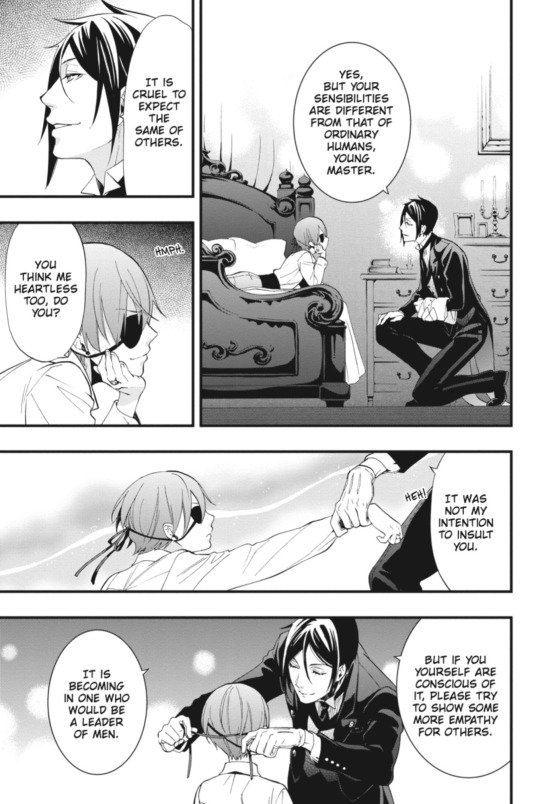

From how relaxed they are around each other, the string that seems to connect them, how they tease each other like old married couple, and repeated each other's words. Everything about this part is so lovely!
There are many other parts/moments that Iove throughout the series, but those are my top five.
Thanks again for the ask!
10 notes
·
View notes
